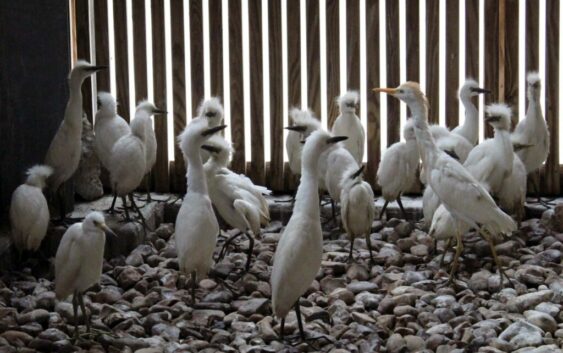- Austin adopts new map that greatly expands area at risk of wildfire
- CenterPoint Energy accelerates infrastructure improvements ahead of hurricane season
- Carolina Hurricanes playoff tickets go on sale Thursday
- Ask the Meteorologist: Why do tornadoes target Tornado Alley, Dixie Alley?
- Nonprofit closes distribution site that aided thousands after Hurricane Helene
Houston SPCA has taken in 1,800 animals, including egret colony, in the wake of Hurricane Beryl

Since Hurricane Beryl, the Houston SPCA has taken in more than 1,800 injured or orphaned wild animals from the region.
On a regular day, the local SPCA gets about 40 to 50 animals. On the day after Beryl hit, they got over 700 in 24 hours – and even over a week later, more animals keep on coming.
The SPCA is now working to rehabilitate the animals, including a colony of nearly 350 egrets blown out of their nests.
For more on the rehabilitation efforts, Sharon Schmalz, Houston SPCA’s wildlife center administrator and former executive director, spoke to Texas Standard.
This transcript has been edited lightly for clarity:
Texas Standard: What kind of animals have you taken in? Tell us more.
Sharon Schmalz: A lot of cattle egrets. Unfortunately, it was a rookery where they had been nesting, and they were just devastated. When we got there on the scene, it was just so sad to see that many, many hundreds were dead. We actually collected about 350 of them and brought them back to our campus to start giving them, you know, fluids and stuff. So, it was quite traumatic.
We also took in a lot, like 233, Mississippi kites. And their populations have just moved up into our area between Austin and Houston, so this was really devastating on these birds. So, we had a lot of kites.
We also took in mourning doves, squirrels, songbirds and, you know, other herons like yellow-crowned night herons. But the largest populations were the cattle egrets and the Mississippi kite. So, it’s crazy.
» MORE: Two named storms into 2024, the Texas State Aquarium is braced for further impact
Let me ask you about the egrets there. How do you deal with the rehab portion of this? I mean, are they all held in one area? And you feed them, and they stay with you for how long? I just can’t even imagine.
Yeah, we couldn’t either. It was just amazing to have that many come in at one time, and we have to, you know, triage each one of them and check them for injuries because these guys were thrown down on the ground.
I mean, it was devastating to them, and they’re all different ages. They’re not all exactly the same age. And, some of them need heat – they’re still babies that don’t have enough feathers on them to keep them warm. So we’ve got a little incubator set up for them. We had a whole huge area of incubators.
Some of them were almost ready to go outside, but we wanted to make sure they were stable before we moved them out. So yeah, it is quite a logistical nightmare when you get that many at one time, but we’ve got such a great group of volunteers. Our staff, we got on it right away knowing that we had to give them some help immediately.